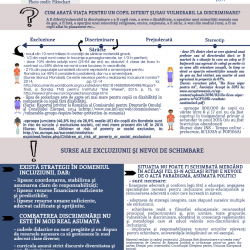In 1995, when I was an exchange student in the United States of America, “Night”, the book by the Nobel Peace Prize Laureate Elie Wiesel, was the first mandatory reading for the English class in the Sophomore Year. We also were guided to the library to search for other books and documents about the Holocaust. There I learned that Elie Wiesel had been born in Sighet. American education, so often criticized for not teaching a sound general knowledge, taught me more about the Holocaust, including the Romanian Holocaust, than the Romanian school system of the 90’s. I can say the same about gender equality, feminism and human rights in general.
Things change for the better, especially under the pressure of the civil society that brings non-discrimination and combating of the hate crime and hate speech into the public space. Given that Europe is ever more divided by hatred and intolerance, it is absolutely necessary that the school catches up with the age we live in and encourages children and youth towards critical thinking. The school must not be silent about discrimination, as if it didn’t exist; it shouldn’t stick a fake framing under the empty slogan of equal chances over the real picture which is rather crooked and filled with injustice.
In schools today, students laugh without hesitation at sexist jokes, and sometimes the teachers join them. And then, the fact that 1 out of 3 women in Romania is subject to a form of gender violence is considered an exaggerated alarmist statistic. At the same time, we don’t find it concerning that less than 20% of the candidates to local public office are women. To use the feminine form in Romanian language of the title President (doamna preşedintă), when talking about a woman who holds a public office is firstly considered to be a mistake, as people resort to the more used phrasing of adding a Madam in front of the masculine name of the title (doamna preşedinte), despite the fact that the feminine form is out there, in both the dictionary, and the real life. If nondiscrimination were taught in school, we’d know that feminism is a good daughter of democracy and its „radical” message is that the slightly majority of over 50% of the world population should enjoy visibility, participation and equal rights.
Camelia Proca
Association for Gender Equality and Freedom – A.L.E.G.
Camelia Proca graduated the Faculty of Literature, History and Journalism at the Lucian Blaga University in Sibiu and, in 2005, specialized in human rights and equal status of women at the Raol Wallenberg Institute for Human Rights and Humanitarian Law in Sweden. She is the founder of A.L.E.G. – Association for Liberty and Equality of Gender which, for the past 12 years, is promoting gender equality through non-formal education programs, such as the yearly Gender Equality Festival, as well as providing support services for the victims of gender-based violence, with pilot projects regarding sexual violence in Romania. Since 2014, Camelia Proca is Board member of the WAVE European network - Women Against Violence Europe. She has also been working in EU projects in the field of environmental protection for many years. Recently, she is also the communication adviser of the first female President of the County Council in Sibiu.










0 Responses